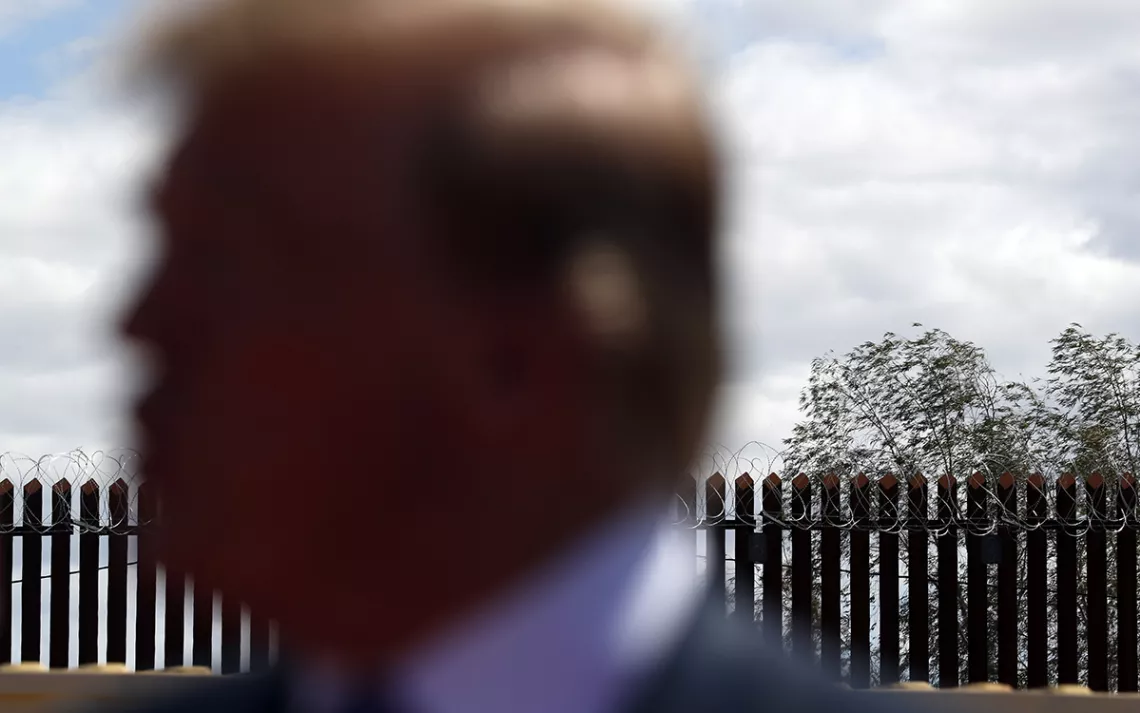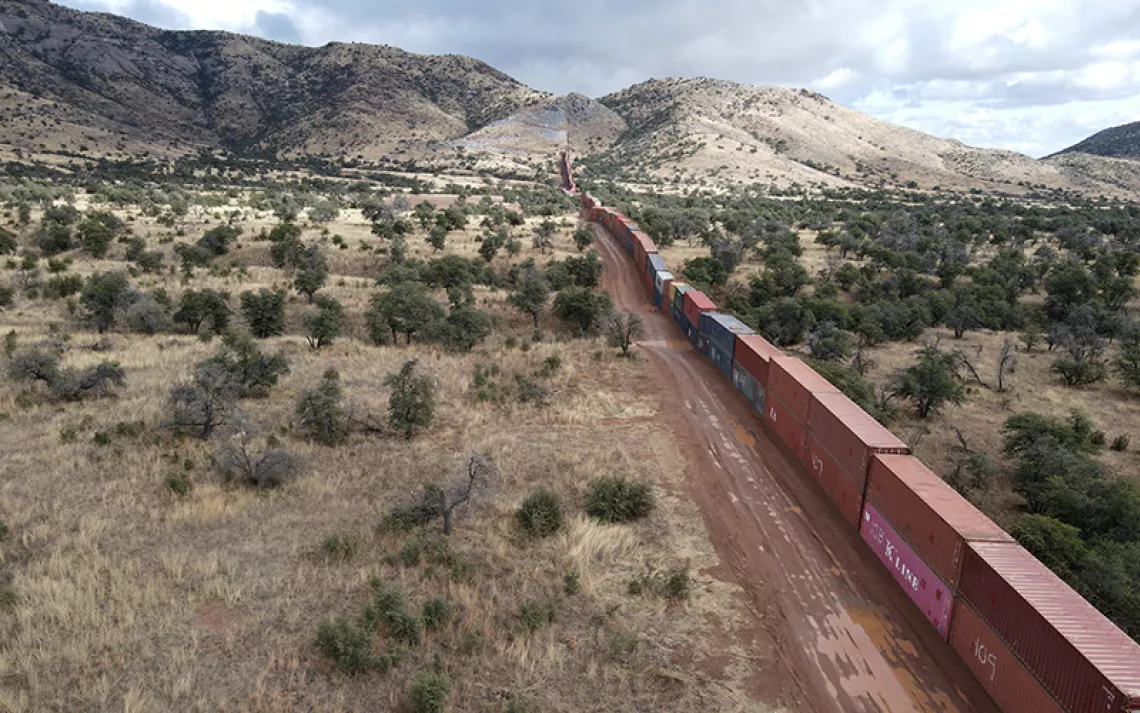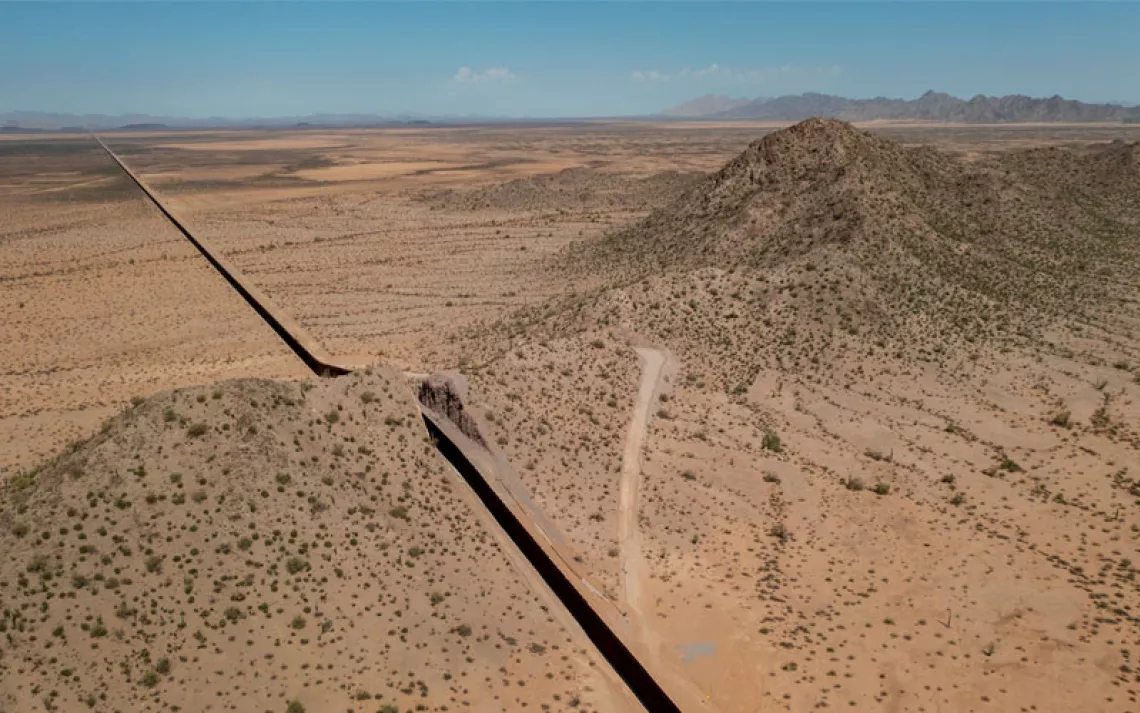Federal Judge Temporarily Blocks Construction on Border Wall
ACLU and the Sierra Club win Round 1 in challenge against Trump’s emergency declaration

On April 5, 2019, Donald Trump visits a new section of border wall in Calexico, California. | Photo by AP Photo/Jacquelyn Martin
The Trump administration, following a string of defeats in federal courts over the past two years, just added another loss to its list. On Friday, May 24, a federal judge in California issued a preliminary injunction against construction on sections of the Trump administration’s proposed wall on the southern border. The decision marks the first major setback in the administration’s move to reallocate funding by emergency declaration, which it announced in mid-February.
On May 17, at the US Northern District Court in Oakland, Judge Haywood S. Gilliam heard roughly three hours of arguments over the constitutionality of President Trump’s plan to reallocate federal monies from defense spending to border wall construction. The lawsuit, which was brought by the ACLU on behalf of the Sierra Club and the Southern Border Communities Coalition, won a temporary halt to $1 billion in projects along the Texas and Arizona borders. Construction had been slated to begin on May 25.
In its decision, the court argued that the administration cannot sidestep congressional appropriation to get funds from elsewhere for a border wall, because it goes against foundational principles regarding the separation of powers. “Congress’s ‘absolute’ control over federal expenditures—even when that control may frustrate the desires of the executive branch regarding initiatives it views as important—is not a bug in our constitutional system,” Gilliam wrote. “It is a feature of that system, and an essential one.”
Dror Ladin, a staff attorney at the ACLU National Security Project who argued the case, responded to the ruling in a statement: “This order is a win for our system of checks and balances, the rule of law, and border communities. The court blocked all the wall projects currently slated for immediate construction. If the administration begins illegally diverting additional military funds, we'll be back in court to block that as well.”
The lawsuit, along with another brought by the State of California and 19 other states, came in the wake of the Trump administration’s emergency declaration regarding the situation on the southern border. Following a 35-day government shutdown, the longest in US history, Congress passed a budget that allocated roughly $1.4 billion for border security, a fraction of the $5.7 billion requested by President Trump. Minutes after Congress began voting on the spending bill, the Trump administration announced plans for the emergency declaration, which would draw $8.1 billion from other agencies to fund the wall.
In addition to arguing that the administration’s planned redistribution of federal monies violated appropriations law, plaintiffs claimed that the government failed to do even basic environmental assessments required under the National Environmental Protection Act. Plaintiffs also contended that construction would cause considerable harm to border communities.
“We've seen the damage that the ever-expanding border wall has inflicted on communities and the environment for decades,” Sierra Club managing attorney Gloria Smith said in a statement. “Walls divide neighborhoods, worsen dangerous flooding, destroy lands and wildlife, and waste resources that should instead be used on the infrastructure these communities truly need.”
At the preliminary injunction hearing, the Department of Justice lawyers argued that construction was appropriate under federal statutes and that Congress had never explicitly denied the administration funds for the wall. Under the proposal, the bulk of the funds—some $6.1 billion—are slated to come from the Department of Defense.
The administration has not formally responded to the ruling. But the day after the decision, President Trump posted on Twitter: “Another activist Obama appointed judge has just ruled against us on a section of the Southern Wall that is already under construction. This is a ruling against Border Security and in favor of crime, drugs and human trafficking. We are asking for an expedited appeal!”
The fight over the border wall is far from over. The court declined to rule on the move to divert $3.6 billion in military construction funding on the basis that the administration hadn’t yet indicated how those funds would be used. Further legal challenges are expected over the use of that money for future projects.
 The Magazine of The Sierra Club
The Magazine of The Sierra Club



